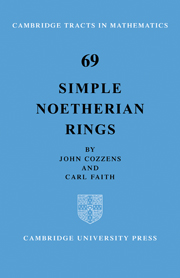Book contents
6 - PCI-rings
Published online by Cambridge University Press: 29 October 2009
Summary
A ‘good’ theory of ring theory is one which generalizes the Wedderburn–Artin theorems for a ring R with radical N, and a ‘good’ theory of modules is one which generalizes the basis theorem for abelian groups. In this chapter we are concerned with the latter, in the setting of Dedekind domains, particularly the aspect which states that every finitely generated module M is a direct sum of finitely many ideals and cyclic modules. A ‘conceptual’ way to effect such a decomposition of M is to notice that M modulo its torsion submodule t(M) is a torsion free module F embeddable in a free module P. Then, the canonical projections of P → R induce projections of F into R which furnish the requisite ideal summands. Moreover, M/t(M) being projective implies that the torsion module t(M) is a summand of M, and the cyclic decomposition for t(M) is a consequence of the fact that R modulo any ideal A ≠ 0 is an Artinian principal ideal ring, hence a uniserial ring over which every module is a direct sum of cyclics (as Köthe showed).
Another way to obtain the cyclic decomposition is to observe that every proper cyclic module R/A is an injective R/A-module. Thus, every cyclic submodule ‘of highest order’ splits off!
We adopt this point of view in this chapter. However, instead of requiring that every proper cyclic right module R/A be injective modulo its annihilator ideal, we make the stronger hypothesis.
- Type
- Chapter
- Information
- Simple Noetherian Rings , pp. 98 - 112Publisher: Cambridge University PressPrint publication year: 1975



